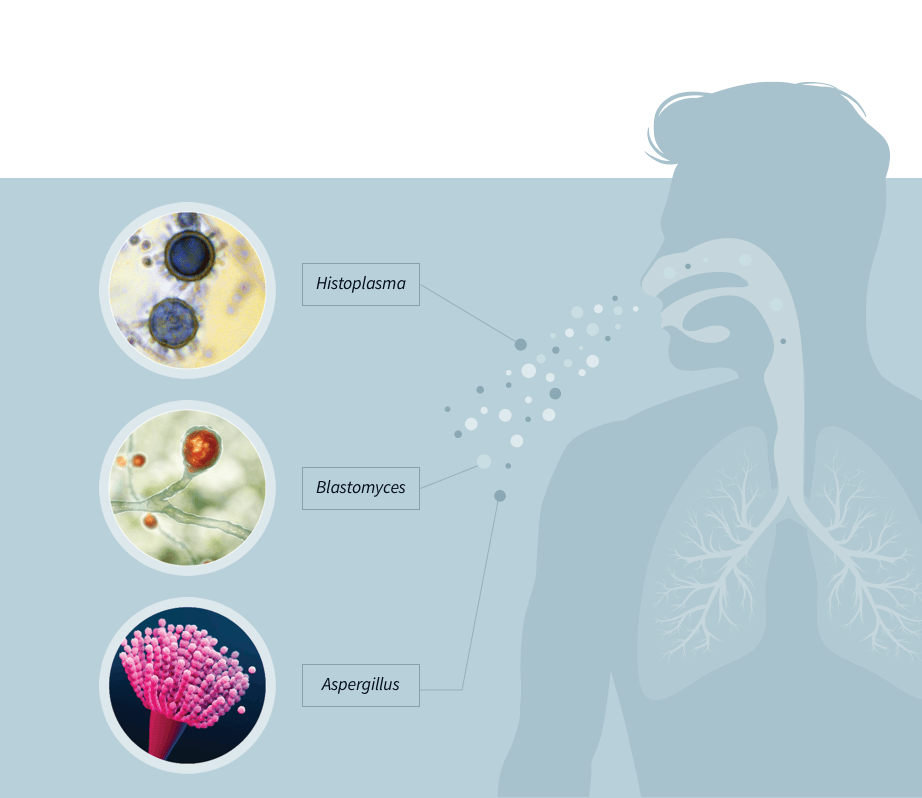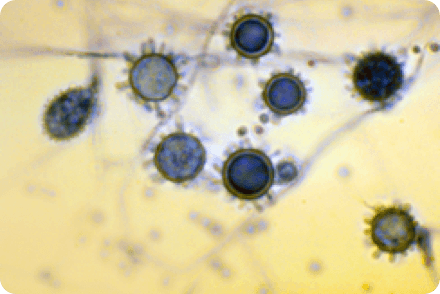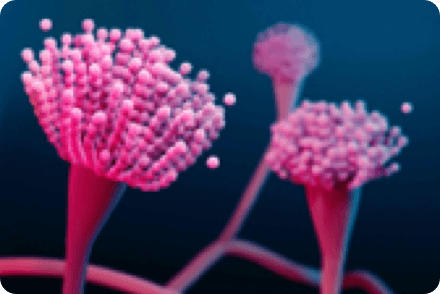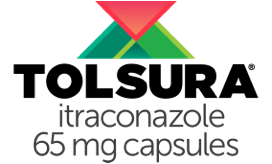HOW DID I GET THIS FUNGAL INFECTION?
UNDERSTANDING FUNGAL INFECTIONS
Just like bacteria and viruses, fungi live in multiple places including the air and ground. Fungi are common in the environment, and people may breathe in or touch fungal spores without getting sick. However, sometimes fungal spores can cause infections, even in people who are otherwise healthy1.
Anyone can get an infection from fungi, but people with weak immune systems are at higher risk1.
Some conditions may increase your risk, such as1:
- cancer
- recent organ or stem cell transplant
- kidney failure
- HIV/AIDS
- recent hospitalization
- immunosuppressant medications including steroids


WHAT TYPE OF FUNGAL INFECTION DO I HAVE?
Some infections, such as histoplasmosis (his-toh-plaz-moh-sis) and blastomycosis (blas-toh-mahy-koh-sis), occur in certain areas of the United States, and may affect people who live in or travel to those areas2,3.
AREAS ENDEMIC FOR INFECTION:


HISTOPLASMA
Common


BLASTOMYCOSIS
Common
OPPORTUNISTIC INFECTION


ASPERGILLOSIS
Common
Aspergillosis (as-per-juh-loh-sis) is an infection caused by a fungus that lives indoors and outdoors all over the country. People with lung diseases or weakened immune systems are at higher risk of getting sick from this fungus4.
For more information on these infections and who might be at risk, visit:
Infectious Diseases Society of America for information on histoplasmosis, blastomycosis, and aspergillosis
IDSA WebsiteCenters for Disease Control and Prevention website on fungal infections
CDC WebsiteSYMPTOMS OF HISTOPLASMOSIS
Many people who are exposed to the fungus Histoplasma never have symptoms. Other people may have flu-like symptoms that usually go away on their own.
2 WEEKS
Symptoms of histoplasmosis may appear about 2 weeks after a person breathes in the fungal spores 5.
However, a more severe and long-lasting infection may develop in people who have inhaled a large amount of the fungus, or people who have weakened immune systems, or people who are very young (<2) or older (>50) in age5,6.
SYMPTOMS OF HISTOPLASMOSIS INCLUDE1:
Fever
Cough
Shortness of breath
Chest pain
Chills
For many people, the symptoms of histoplasmosis will go away within a few weeks to a month5.
In some people, usually those who have weakened immune systems, histoplasmosis can develop into a long-term lung infection, or it can spread from the lungs to other parts of the body. Any organ system can be affected, including bone marrow, skin, brain, adrenal glands, and gastrointestinal tract6,7.
SYMPTOMS OF BLASTOMYCOSIS
Approximately half of people with blastomycosis will show symptoms8.
3 WEEKS - 3 MONTHS
Symptoms of blastomycosis usually appear between 3 weeks and 3 months after breathing in the fungal spores8.
THE SYMPTOMS OF BLASTOMYCOSIS ARE OFTEN SIMILAR TO THE SYMPTOMS OF FLU OR OTHER LUNG INFECTIONS, AND CAN INCLUDE8,9:
Fatigue (extreme tiredness)
Muscle aches or joint pain
Fever
Cough
Night sweats
Chest pain
Weight loss
In some people, particularly those who have weakened immune systems, blastomycosis can spread from the lungs to other parts of the body, such as the skin, bones and joints, and the central nervous system (the brain and spinal cord)8,9.
SYMPTOMS OF ASPERGILLOSIS
Aspergillosis has a wide range of symptoms depending on a person’s underlying health conditions at the time of infection10.
Most healthy people who breathe in Aspergillus spores do not develop any symptoms10.
HOW IS HISTOPLASMOSIS TREATED?
FOR SOME PEOPLE, THE SYMPTOMS OF HISTOPLASMOSIS WILL GO AWAY WITHOUT TREATMENT.
HOWEVER, PRESCRIPTION ANTIFUNGAL MEDICATION IS NEEDED TO TREAT THESE TYPES OF HISTOPLASMOSIS14:
- severe histoplasmosis in the lungs
- hronic histoplasmosis
- infections that have spread from the lungs to other parts of the body (disseminated histoplasmosis)
ITRACONAZOLE IS A TYPE OF ANTIFUNGAL MEDICATION THAT IS COMMONLY USED TO TREAT HISTOPLASMOSIS14:
Amphotericin B is used to treat severe histoplasmosis in the lungs and severe cases of disseminated histoplasmosis. After the patient’s condition has stabilized, then they may be switched to itraconazole treatment19.
12-24 MONTHS
Depending on the severity of the infection and the person’s immune status, the treatment may last a few months or up to 12-24 months14.
It is important to keep taking your medication as prescribed, in order to have a good clinical outcome.
HOW IS BLASTOMYCOSIS TREATED?
MOST PEOPLE WITH BLASTOMYCOSIS WILL NEED PRESCRIPTION ANTIFUNGAL MEDICATION15.

MILD TO MODERATE BLASTOMYCOSIS
is usually treated with a medication called itraconazole15.
SEVERE BLASTOMYCOSIS
may be treated with a medication called amphotericin B. After the patient’s condition has stabilized, then they may be switched to itraconazole treatment15.
6-12 MONTHS
Depending on the severity of the infection and the person’s immune status, the course of treatment can range from 6-12 months.
It is important to keep taking your medication as prescribed, in order to have a good clinical outcome.
HOW IS ASPERGILLOSIS TREATED?
THE SPECIFIC TREATMENT TYPE DEPENDS ON THE TYPE OF ASPERGILLOSIS THE PATIENT HAS, AND HOW STRONG OR WEAK THEIR IMMUNE SYSTEM IS16.
MONTHS
Treatment may last for weeks or months.
It is important to keep taking your medication as prescribed, in order to have a good clinical outcome.
ALLERGIC ASPERGILLOSIS
Examples
- Allergic bronchopulmonary aspergillosis (ABPA)
- Allergic Aspergillus sinusitis
Recommended Treatment16,17
- Itraconazole
- May consider corticosteroids
INVASIVE ASPERGILLOSIS
Examples
- Invasive aspergillosis (in any system of the body)
- Aspergillosis of the skin
- Chronic pulmonary aspergillosis
Recommended Treatment16,17
- Voriconazole
- Other options: lipid amphotericin B, posaconazole, isavuconazole, itraconazole,
- If azoles and amphotericin are contraindicated: caspofungin, and micafungin
ASPERGILLOMA
(“FUNGAL BALL”)
Recommended Treatment16,17
- If no symptoms, just monitor
- If symptoms, surgery to remove fungus ball
- If surgery cannot completely remove it, use itraconazole or voriconazole
WHAT IS TOLSURA?
INDICATIONS AND IMPORTANT SAFETY INFORMATION
TOLSURA is a prescription medicine used to treat the following fungal infections in adults: blastomycosis, histoplasmosis, and aspergillosis.
WHAT IS THE MOST IMPORTANT INFORMATION I SHOULD KNOW ABOUT TOLSURA?
TOLSURA CAN CAUSE SERIOUS SIDE EFFECTS, INCLUDING:
- Congestive heart failure. TOLSURA can cause congestive heart failure or make congestive heart failure that you already have worse. Stop taking TOLSURA and call your doctor right away if you have any of these symptoms of congestive heart failure:
- shortness of breath
- swelling of your feet, ankles, or legs
- sudden weight gain
- increased tiredness
- coughing up white or pink mucus (phlegm)
- fast heartbeat
- waking up at night more
- than normal
- Heart problems and other serious medical problems. Serious medical problems that affect the heart and other parts of your body can happen if you take TOLSURA with certain other medicines.
- Do not take TOLSURA if you take any of the following medicines:
- avanafil
- disopyramide
- dofetilide
- dronedarone
- eplerenone
- ergot alkaloids (such as dihydroergotamine or ergotamine)
- felodipine
- irinotecan
- isavuconazonium
- simvastatin
- ticagrelor
- ivabradine
- lomitapide
- lovastatin
- lurasidone
- methadone
- midazolam (taken by mouth)
- naloxegol
- nisoldipine
- pimozide
- quinidine
- ranolazine
- triazolam
- Do not take TOLSURA if you have kidney or liver problems and take any of the following medicines:
- colchicine
- fesoterodine
- solifenacin
- Do not take TOLSURA:
- If you have been told that enzymes in your body, called CYP2D6 or CYP3A4, break down (metabolize) certain medicines in your body too slowly.
- If you are taking the medicine eliglustat and are also taking a medicine that slows the rate that your body breaks down (metabolizes) certain other medicines (CYP2D6 inhibitor). Ask your doctor or pharmacist if you take any of these medicines.
These are not complete lists of medicines that can interact with TOLSURA. TOLSURA may affect the way other medicines work, and other medicines may affect how TOLSURA works. You can ask your pharmacist for a list of medicines that interact with TOLSURA.
Before you start taking TOLSURA, tell your doctor about all the medicines you take, including prescription and over-the-counter medicines, vitamins, and herbal supplements.
Before you start any new medicine, ask your doctor or pharmacist if it is safe to take it with TOLSURA or within 2 weeks after stopping treatment with TOLSURA.
- Liver problems. TOLSURA can cause serious liver problems, which may be severe and lead to death. Stop taking TOLSURA and call your doctor right away if you have any of these symptoms of liver problems:
- unusual fatigue
- loss of appetite
- nausea or vomiting
- your skin or the white part of your eyes turn yellow (jaundice)
- dark (tea-colored) urine
- light-colored stools (bowel movement)
Do not take TOLSURA:
- if you are allergic to itraconazole or any of the ingredients in TOLSURA. Please see the end of the Patient Information leaflet for a complete list of ingredients in TOLSURA.
Before taking TOLSURA, tell your doctor about all of your medical conditions, including if you:
- have heart problems.
- have lung problems.
- have kidney problems.
- have liver problems.
- have had an allergic reaction to a medicine used to treat a fungal infection.
- are pregnant or plan to become pregnant. It is not known if
- TOLSURA will harm your unborn baby. Tell your doctor if you become pregnant during treatment with TOLSURA.
- are breastfeeding or plan to breastfeed. TOLSURA can pass into your breast milk. Talk to your doctor about the best way to feed your baby if you take TOLSURA.
Before you start taking TOLSURA, tell your doctor about all the medicines you take, including prescription and over-the-counter medicines, vitamins, and herbal supplements. Especially tell your doctor if you take:
- a medicine to treat high blood pressure or certain other heart problems called a calcium channel blocker.
- a medicine to reduce acid in your stomach called a proton pump inhibitor, such as omeprazole.
WHAT ARE THE POSSIBLE SIDE EFFECTS OF TOLSURA?
TOLSURA may cause serious side effects, including:
- See “What is the most important information I should know about TOLSURA?”
- Nerve problems (neuropathy). Nerve problems have happened in some people who have taken TOLSURA for longer than 3 months. Call your doctor right away if you have tingling or numbness in your hands or feet. Your doctor may stop your treatment with TOLSURA if you have nerve problems.
- Hearing loss. Hearing loss can happen in some people who take TOLSURA. Hearing loss usually improves when treatment with TOLSURA is stopped, but hearing loss has been permanent in some people. Call your doctor if you have any changes in your hearing.
The most common side effects of TOLSURA include:
- nausea
- rash
- vomiting
- swelling
- headache
- diarrhea
- fatigue
- fever
- itching
- high blood pressure
- abnormal liver blood tests
- stomach pain
- dizziness
- low blood potassium levels
- loss of appetite
- general feeling of discomfort
- decreased sex drive
- sleepiness
- elevated levels of a type of protein, called albumin, in your urine
- erectile dysfunction
These are not all the possible side effects of TOLSURA.
Call your doctor for medical advice about side effects. You may report side effects to the FDA at 1-800-FDA-1088 or call Mayne Pharma at 1-844-825-8500.
REFERENCES:
- Centers for Disease Control and Prevention (CDC). Who gets fungal infections? https://www.cdc.gov/fungal/infections/index.html. Accessed February 15, 2021.
- Centers for Disease Control and Prevention (CDC). Sources of histoplasmosis. https://www.cdc.gov/fungal/diseases/histoplasmosis/causes.html. Accessed February 15, 2021.
- Centers for Disease Control and Prevention (CDC). Sources of blastomycosis. https://www.cdc.gov/fungal/diseases/blastomycosis/causes.html. Accessed February 15, 2021.
- Centers for Disease Control and Prevention (CDC). Sources of aspergillosis. https://www.cdc.gov/fungal/diseases/aspergillosis/causes.html. Accessed February 15, 2021.
- Azar MM, Loyd JL, Relich RF, et al. Current Concepts in the Epidemiology, Diagnosis, and Management of Histoplasmosis Syndromes. Semin Respir Crit Care Med. 2020; 41:13 -30.
- Kauffman CA. Histoplasmosis. Clin Chest Med. 2009; 30:217-225. 2009.
- Assi MA, Sandid MS, Baddour LM, et al. Systemic Histoplasmosis: A 15-Year Retrospective Institutional Review of 111 Patients. Medicine. 2007; 86:162-169.
- Khuu D, Shafir S, Bristow B, Sorvillo F. Blastomycosis Mortality Rates, United States, 1990 -2010. Emerging Infectious Diseases. 2014;20(11):1789-1794. DOI: http://dx.doi.org/10.3201/eid2011.131175.
- Baumgardner DJ, Halsmer SE, Egan G. Symptoms of pulmonary blastomycosis: northern Wisconsin, United States. Wilderness Environ Med. 2004 Winter; 15(4): 250-6.
- Barnes PD, Marr KA. Aspergillosis: Spectrum of Disease, Diagnosis, and Treatment. Infect Dis Clin N Am. 2006; 20:545 -561.
- Moss RB. Treatment options in severe fungal asthma and allergic bronchopulmonary aspergillosis. Eur Respir J. 2014; 43:1487-1500.
- 12. American Academy of Allergy Asthma and Immunology (AAAAI). Allergic bronchopulmonary aspergillosis (ABPA). https://www.aaaai.org/conditionsand-treatments/related-conditions/allergic-bronchopulmonary-aspergillosis. Accessed January 15, 2021.
- Cedars-Sinai. Allergic fungal sinusitis. https://www.cedars-sinai.org/healthlibrary/diseases-and-conditions/a/allergic-fungal-sinusitis.html. Accessed February 15, 2021.
- Wheat LJ, Freifeld AG, Kleiman MB, et al. Clinical Practice Guidelines for the Management of Patients with Histoplasmosis: 2007 Update by the Infectious Diseases Society of America. Clinical Infectious Diseases. 2007; 45:807 -825.
- Chapman SW, Dismukes WE, Proia LA, et al. Clinical Practice Guidelines for the Management of Blastomycosis: 2008 Update by the Infectious Diseases Society of America. Clinical Infectious Diseases. 2008; 46:1801 -1812.
- Patterson TF, Thompson GR III, Denning DW, et al. Practice Guidelines for the Diagnosis and Management of Aspergillosis: 2016 Update by the Infectious Diseases Society of America. Clinical Infectious Diseases. 2016;63(4):e1-e60.
- Centers for Disease Control and Prevention (CDC). Treatment of aspergillosis. https://www.cdc.gov/fungal/diseases/aspergillosis/treatment.html. Accessed January 22, 2021.
INDICATIONS AND IMPORTANT SAFETY INFORMATION
TOLSURA is a prescription medicine used to treat the following fungal infections in adults: blastomycosis, histoplasmosis, and aspergillosis.
WHAT IS THE MOST IMPORTANT INFORMATION I SHOULD KNOW ABOUT TOLSURA?
TOLSURA CAN CAUSE SERIOUS SIDE EFFECTS, INCLUDING:
- Congestive heart failure. TOLSURA can cause congestive heart failure or make congestive heart failure that you already have worse. Stop taking TOLSURA and call your doctor right away if you have any of these symptoms of congestive heart failure:
- shortness of breath
- swelling of your feet, ankles, or legs
- sudden weight gain
- increased tiredness
- coughing up white or pink mucus (phlegm)
- fast heartbeat
- waking up at night more
- than normal
- Heart problems and other serious medical problems. Serious medical problems that affect the heart and other parts of your body can happen if you take TOLSURA with certain other medicines.
- Do not take TOLSURA if you take any of the following medicines:
- avanafil
- disopyramide
- dofetilide
- dronedarone
- eplerenone
- ergot alkaloids (such as dihydroergotamine or ergotamine)
- felodipine
- irinotecan
- isavuconazonium
- simvastatin
- ticagrelor
- ivabradine
- lomitapide
- lovastatin
- lurasidone
- methadone
- midazolam (taken by mouth)
- naloxegol
- nisoldipine
- pimozide
- quinidine
- ranolazine
- triazolam
- Do not take TOLSURA if you have kidney or liver problems and take any of the following medicines:
- colchicine
- fesoterodine
- solifenacin
- Do not take TOLSURA:
- If you have been told that enzymes in your body, called CYP2D6 or CYP3A4, break down (metabolize) certain medicines in your body too slowly.
- If you are taking the medicine eliglustat and are also taking a medicine that slows the rate that your body breaks down (metabolizes) certain other medicines (CYP2D6 inhibitor). Ask your doctor or pharmacist if you take any of these medicines.
These are not complete lists of medicines that can interact with TOLSURA. TOLSURA may affect the way other medicines work, and other medicines may affect how TOLSURA works. You can ask your pharmacist for a list of medicines that interact with TOLSURA.
Before you start taking TOLSURA, tell your doctor about all the medicines you take, including prescription and over-the-counter medicines, vitamins, and herbal supplements.
Before you start any new medicine, ask your doctor or pharmacist if it is safe to take it with TOLSURA or within 2 weeks after stopping treatment with TOLSURA.
- Liver problems. TOLSURA can cause serious liver problems, which may be severe and lead to death. Stop taking TOLSURA and call your doctor right away if you have any of these symptoms of liver problems:
- unusual fatigue
- loss of appetite
- nausea or vomiting
- your skin or the white part of your eyes turn yellow (jaundice)
- dark (tea-colored) urine
- light-colored stools (bowel movement)
Do not take TOLSURA:
- if you are allergic to itraconazole or any of the ingredients in TOLSURA. Please see the end of the Patient Information leaflet for a complete list of ingredients in TOLSURA.
Before taking TOLSURA, tell your doctor about all of your medical conditions, including if you:
- have heart problems.
- have lung problems.
- have kidney problems.
- have liver problems.
- have had an allergic reaction to a medicine used to treat a fungal infection.
- are pregnant or plan to become pregnant. It is not known if
- TOLSURA will harm your unborn baby. Tell your doctor if you become pregnant during treatment with TOLSURA.
- are breastfeeding or plan to breastfeed. TOLSURA can pass into your breast milk. Talk to your doctor about the best way to feed your baby if you take TOLSURA.
Before you start taking TOLSURA, tell your doctor about all the medicines you take, including prescription and over-the-counter medicines, vitamins, and herbal supplements. Especially tell your doctor if you take:
- a medicine to treat high blood pressure or certain other heart problems called a calcium channel blocker.
- a medicine to reduce acid in your stomach called a proton pump inhibitor, such as omeprazole.
WHAT ARE THE POSSIBLE SIDE EFFECTS OF TOLSURA?
TOLSURA may cause serious side effects, including:
- See “What is the most important information I should know about TOLSURA?”
- Nerve problems (neuropathy). Nerve problems have happened in some people who have taken TOLSURA for longer than 3 months. Call your doctor right away if you have tingling or numbness in your hands or feet. Your doctor may stop your treatment with TOLSURA if you have nerve problems.
- Hearing loss. Hearing loss can happen in some people who take TOLSURA. Hearing loss usually improves when treatment with TOLSURA is stopped, but hearing loss has been permanent in some people. Call your doctor if you have any changes in your hearing.
The most common side effects of TOLSURA include:
- nausea
- rash
- vomiting
- swelling
- headache
- diarrhea
- fatigue
- fever
- itching
- high blood pressure
- abnormal liver blood tests
- stomach pain
- dizziness
- low blood potassium levels
- loss of appetite
- general feeling of discomfort
- decreased sex drive
- sleepiness
- elevated levels of a type of protein, called albumin, in your urine
- erectile dysfunction
These are not all the possible side effects of TOLSURA.
Call your doctor for medical advice about side effects. You may report side effects to the FDA at 1-800-FDA-1088 or call Mayne Pharma at 1-844-825-8500.
